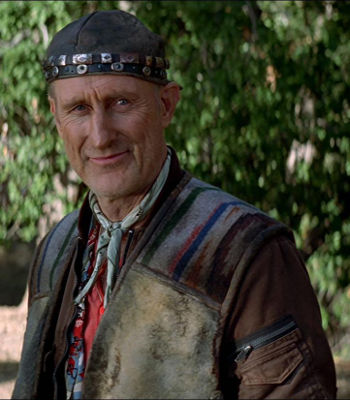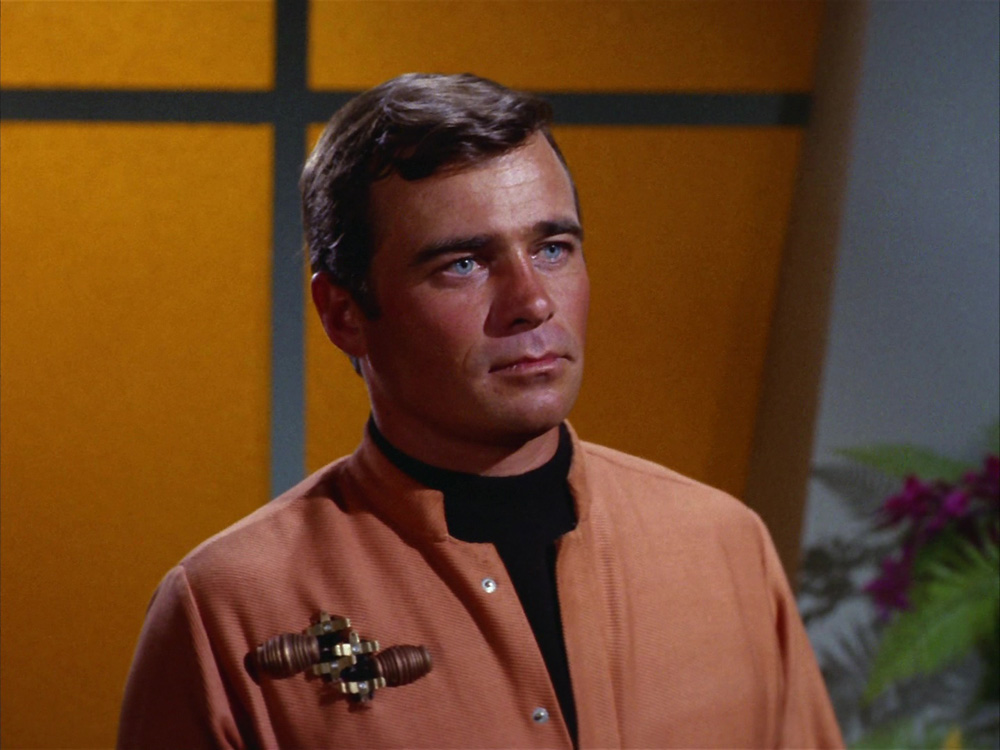Zefram Cochrane (Myriad)
UFP150 Timeline
| Species | Human |
| Sex | Male |
| Born | 27 Jan 2031[1] |
| Status | Presumed Deceased (2123)[1] |
| Advertising |
Zefram Cochrane was born on 27 January 2031, into the chaos of the decades between the Eugenics Wars and World War III on Earth. In 2044, Cochrane's parents, academics at the University of Chicago, were killed in a purge of academia. He had been raised to be an intellectual like his parents, and his desire to study the sciences remained acceptable in only one area: warfare. Forced into pragmatism to survive, Cochrane found work as a military contractor. There, he began to study matter/antimatter reactions, which fascinated him. Reports of the excavation of an extraterrestrial element, called dilithium, near the South Pole also piqued Cochrane's interest.[1]
Although his motives were an opportunistic desire for money, Cochrane kept much of his research into a matter/antimatter reactor secret, and therefore out of the hands of those who would have turned it into devastating weaponry. He assembled a circle of trusted scientists and engineers for his project, and one of his first recruits was an engineer named Lily Sloane. Following the end of World War III in 2053, Cochrane had a computer expert in his circle erase the location of an already secret missile silo near Bozeman, Montana from all military records, then moved his group there. Over the course of the next ten years, the group slowly assembled what would become the Phoenix, Earth's first warp capable spacecraft.[1]
On 5 April 2063, Cochrane piloted the Phoenix past the speed of light. This caught the attention of a passing Vulcan science vessel,[2] the T'Plana-Hath, commanded by Solkar.[3] The ensuing decades saw a radical increase in Cochrane's influence, with massive demand for his warp engine design as companies and nations began to commission starships of their own,[1] including the S.S. Valiant[4] and the S.S. Conestoga.[5] The engines of the J class and Y class freighters constructed for the fledgling Earth Cargo Service were designed by Cochrane himself, and legend had it that he signed the inside of the reactor casing of each ship's engine.[6]
In 2101,[1] Cochrane, seeking escape from his fame and notoriety on Earth, led an expedition to colonize Alpha Centauri; because of the attention that Cochrane brought to the expedition, the colony thrived.[1] Cochrane returned to Earth in 2121, where he met Henry Archer, an associate professor of engineering at the State University of New York at Albany: Archer's PhD dissertation was a workable design for a Warp 5 engine.[1] Within two years, Archer and Cochrane broke ground on the Warp Five Complex,[7] which was built on the same site as the missile complex where the Phoenix was launched sixty years earlier.[1]
Two years after the Warp Five Complex was dedicated, Cochrane, his health failing from the stresses of the undertaking, took a small warp ship that his company had designed but never marketed, and left Earth.[1] Cochrane's disappearance would become one of the greatest mysteries of the century, leading to several false starts where people believed that they had found Cochrane's long-lost vessel.[8] The mystery would not be solved, however, until nearly 150 years later, when the Shuttlecraft Galileo II NCC-1701/7, piloted by Captain James T. Kirk, Commander Spock, and Doctor Leonard McCoy of the U.S.S. ''Enterprise'' NCC-1701, were pulled off course to Gamma Canaris N by a being known as the Companion on Stardate 3219.4. The Companion was a noncorporeal entity that had rescued Cochrane, and restored him to youth and health, which it had maintained for him ever since.[9] The process was so effective, the effects of radiation exposure and alcohol abuse from his youth were eliminated, leaving him looking far younger than he had even as a young man.[1] Accompanying the Enterprise crew was Assistant Federation Commissioner Nancy Hedford, who was dying from the rare Sakuro's Disease. Hedford agreed to merge with the Companion, which cured her illness and gave the entity physical form, so that it could finally share its love for Cochrane, who was unable to reciprocate its affection in its noncorporeal state. The two expected to live out the remainder of their normal, human lifespans together, as Hedford/Companion would no longer be able to restore the couple's youth in their combined state. Kirk agreed to keep their existence secret, and officially reported that Hedford had died on the shuttle, with no mention of Cochrane.[9]
Notes and References
- ↑ 1.00 1.01 1.02 1.03 1.04 1.05 1.06 1.07 1.08 1.09 1.10 Goodman, David A. Federation: The First 150 Years. Titan Books, October 2013.
- ↑ Berman, Rick (Producer). Star Trek: First Contact. Directed by Jonathan Frakes. Story by Rick Berman & Brannon Braga & Ronald D. Moore. Screenplay by Brannon Braga & Ronald D. Moore. Paramount Pictures. 22 November 1996.
- ↑ "Homestead." Star Trek: Voyager, Season 7, Episode 23. Paramount Pictures Corporation, 2001.
- ↑ Roddenberry, Gene (Executive Producer). "The Cage". Star Trek, season 0, episode 0 (Production number 01). Directed by Robert Butler. Written by Gene Roddenberry. Released 1986. Desilu Productions. 1965.
- ↑ Berman, Rick & Brannon Braga (Executive Producers). "Terra Nova". Enterprise, season 1, episode 6 (Production number 06). Directed by LeVar Burton. Story by Rick Berman & Brannon Braga. Teleplay by Antoinette Stella. Paramount Pictures. 24 October 2001.
- ↑ Berman, Rick & Brannon Braga (Executive Producers). "Fortunate Son". Enterprise, season 1, episode 10 (Production number 10). Directed by LeVar Burton. Written by James Duff. Paramount Pictures. 21 November 2001.
- ↑ Berman, Rick & Brannon Braga (Executive Producers). "Broken Bow". Enterprise, season 1, episode 1-2 (Production number 01-02). Directed by James Conway. Written by Rick Berman & Brannon Braga. Paramount Pictures. 26 September 2001.
- ↑ "Future Tense." Enterprise, Season 2, Episode 16. Paramount Pictures Corporation, 19 February 2003.
- ↑ 9.0 9.1 Roddenberry, Gene (Executive Producer). "Metamorphosis." Star Trek, Season 2, Episode 2. Directed by Ralph Senensky. Written by Gene L. Coon. Desilu Productions, 10 November 1967.


